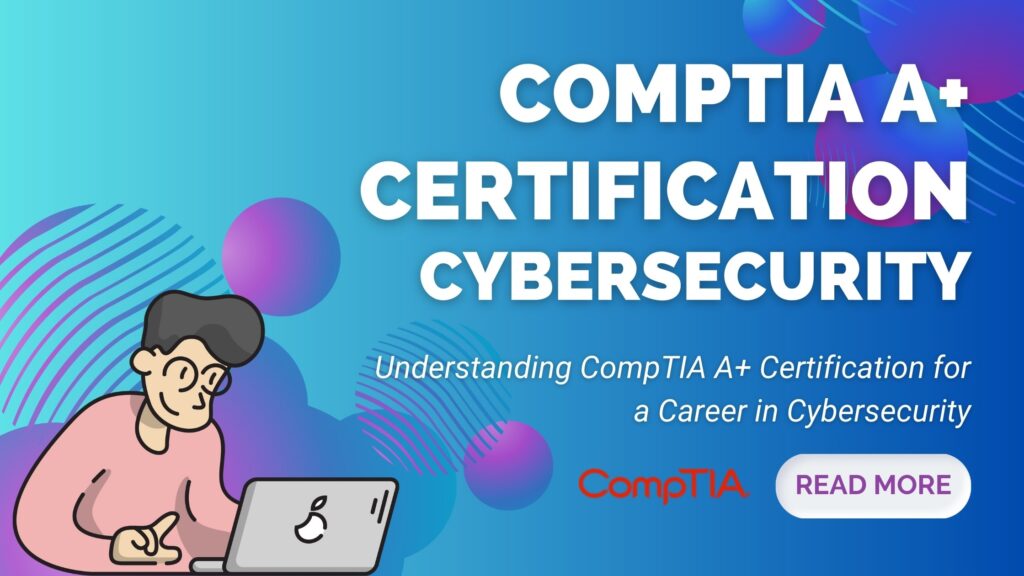InterCoast Colleges is a specialized institution that provides career-focused education and training for individuals seeking to build a career in the field of cybersecurity. One of the key certifications offered by InterCoast Colleges is the CompTIA A+ certification, a valuable credential recognized globally.
What is CompTIA A+ Certification?
CompTIA A+ certification is an entry-level certification covering a broad range of IT support and cybersecurity topics. The certification is designed to provide individuals with the foundational knowledge and skills necessary to pursue a career in IT support, emphasizing cybersecurity. CompTIA A+ certification is recognized globally as a valuable credential and a prerequisite for many other IT and cybersecurity certifications.
The exam for CompTIA A+ certification is divided into two parts, A+ Core 1 and A+ Core 2, both of which cover topics related to cybersecurity. Let’s dive into the details of each part.
A+ Core 1
A+ Core 1 covers topics related to cybersecurity, hardware, networking, and mobile devices. The following topics are covered in detail:
Cybersecurity
- Understanding cybersecurity concepts and best practices, such as data privacy and access control
- Identifying common security threats, such as malware and phishing attacks
- Configuring and using firewalls and antivirus software
- Mobile Devices
- Identifying common mobile device types, such as smartphones and tablets
- Understanding mobile device network connectivity and email configuration
- Troubleshooting common mobile device issues
Networking
- Identifying common networking hardware devices, such as routers and switches
- Understanding TCP/IP addressing and subnetting
- Configuring wireless networks
Hardware
- Identifying and installing various types of hardware components, such as motherboards, CPUs, RAM, and storage devices
- Troubleshooting hardware issues, such as failed power supplies and failed hard drives.
- Understanding best practices for safely handling and disposing of electronic devices
A+ Core 2
A+ Core 2 covers cybersecurity, operating systems, and software troubleshooting. The following topics are covered in detail:
Cybersecurity
- Understanding common security threats, such as malware, viruses, and phishing attacks
- Implementing security best practices, such as user awareness training and password policies
- Configuring and using firewalls and antivirus software
Operating Systems
- Understanding common operating systems, such as Windows, Mac OS, and Linux
- Installing and configuring operating systems
- Configuring and managing users, groups, and shared resources
Software Troubleshooting
- Identifying and resolving common software issues, such as failed installations and application crashes
- Understanding the basics of scripting and automation
- Configuring and using remote access tools to troubleshoot software issues
How do InterCoast Colleges help?
InterCoast Colleges is committed to providing students with the education and hands-on training needed to pass the CompTIA A+ certification exams and pursue a career in cybersecurity. The college’s experienced instructors offer in-depth training on topics covered in the A+ Core 1 and Core 2 exams, focusing on cybersecurity concepts and best practices.
InterCoast Colleges provides students access to industry-standard equipment and software to get a feel for what it’s like to work in a real-world IT and cybersecurity environment. The college’s hands-on approach to learning ensures that students are prepared for the real-world challenges of working in IT and cybersecurity support.
Conclusion
CompTIA A+ certification is a valuable credential that provides individuals with the foundational knowledge and skills needed to pursue a career in IT and cybersecurity support. InterCoast Colleges offers comprehensive training and hands-on experience that prepares students for the CompTIA A+ certification exams and for working in the field.
Sources:
[1] https://www.comptia.org/certifications/a
[2] https://www.comptia.org/training/books/a-core-1-220-1101-study-guide
[3] https://www.comptia.org/faq/a/what-is-comptia-a-certification
[4] https://www.comptia.org/faq/a/10-reasons-why-you-should-get-comptia-a-certified
[5] https://www.comptia.jp/pdf/comptia-a-220-1001-exam-objectives.pdf
[6] https://www.comptia.org/training/books
[7] https://www.comptia.org/faq/a/what-is-on-the-comptia-a-exam


